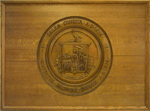Salem Common
From Salem Links and Lore
- Salem Common is a 9 acre green space near the center of Salem with three monuments and some 30 buildings surrounding it. Once a low hilly area with marshy ponds, in 1802 this was improved to make a flat training field for local militias. The common was also once used to grazing livestock and rope making. The cast iron fence was added in 1850 and plantings of elm and maple trees replaced the poplar trees.
- In the weeks following the Salem Fire in 1914, the common was temporary home to many who had lost their homes in the fire.
- It was also used as the playground for nearby Phillips School (now replaced with residential housing.)
- In 1976, the Salem Bicentennial Commission made some renovations to Salem Common and dedicated a new "Washington Arch" at the main gateway. The new arch, which stands at 28 feet high, is based on drawings made the woodcarver Samuel McIntire. The original arch had been removed previously.
- The bandstand at the Salem Common was constructed in 1926 in commemoration of the city's Tercentennial. Philip Horton Smith designed this finely proportioned bandstand in Colonial Revival style, domed and temple-like. In 1976, the bandstand was dedicated to longtime Salem Band director, Jean Missud or the Salem Cadet Band fame.
- In 1995, chainsaw artist Ken Dudley carved a likeness of famous woodcarver Samuel McIntire into a dead oak stump on the common and donated it to the city of Salem.
- According to the Park and Recreation Department, once around the common is 1/2 mile.
See Also
- "Salem's grand common once a pasture for livestock" Salem News, May 1, 2006. p.B5
- "An un-common likeness"(chainsaw carving of Samuel McIntire) Salem Evening News, May 3, 1995. p.1
- Salem Common Image on SalemWeb page
- Historical sketch of Salem, 1626-1879 by Charles S. Osgood, p. 249
- A Stroll through Historic Salem by Samuel Chamberlain, p. 43
- Vertical File in Salem Collection- Salem Common
